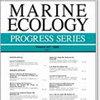Divergent learning responses to a spatially consistent olfactory stimulus in two reef shark species
IF 2.1
3区 环境科学与生态学
Q2 ECOLOGY
引用次数: 0
Abstract
ABSTRACT: There is growing evidence of the important role learning plays in shark foraging, but few studies have examined the relationship between learning and foraging behavior in free-living settings. We addressed this knowledge gap by experimentally contrasting responses of blacktip reef Carcharhinus melanopterus and sicklefin lemon Negaprion acutidens sharks to an olfactory-only feeding stimulus—baited remote underwater video stations (BRUVS)—that was either spatially randomized (as a control) or offered repeatedly at the same location in the lagoon of Tetiaroa, French Polynesia. Relative to their response to the randomized BRUVS, blacktip reef sharks appeared to sensitize to the repeated treatment, exhibiting increasing relative abundance upon introduction of the cue (maximum number of individuals of a species observed on any frame of a video [MaxN] at deployment) and decreasing arrival times as the experiment progressed. By contrast, sicklefin lemon shark responses were either consistent across control and treatment BRUVS over time or suggested habituation (as evidenced by declining MaxN in response to the spatially repeated exposure). Accordingly, our findings advance our understanding of shark cognition by highlighting that sensitized learning responses to stable feeding cues can develop even when the olfactory attractant is not accompanied by a reward, while also indicating that shark responses to these cues can be species-specific. They also suggest that, for at least some shark species, olfactory cues alone could lead to learned responses that confound non-invasive efforts to monitor shark populations and communities (e.g. with BRUVS) and drive spatial behavior with the potential to affect both ecotourism and negative human-shark interactions.两种礁鲨对空间一致的嗅觉刺激的不同学习反应
摘要:越来越多的证据表明,学习在鲨鱼觅食过程中扮演着重要角色,但很少有研究考察了自由生活环境中学习与觅食行为之间的关系。为了填补这一知识空白,我们通过实验对比了黑鳍礁鲨和镰鳍柠檬鲨对嗅觉刺激--诱饵远程水下视频站(BRUVS)--的反应。相对于黑鳍礁鲨对随机 BRUVS 的反应,黑鳍礁鲨似乎对重复处理敏感,在引入提示(部署时在任何一帧视频中观察到的物种最大个体数[MaxN])后,黑鳍礁鲨的相对丰度不断增加,并且随着实验的进行,黑鳍礁鲨的到达时间不断缩短。相比之下,镰鳍柠檬鲨在对照组和处理组 BRUVS 中的反应要么在时间上保持一致,要么表现为习惯性反应(MaxN 随空间重复暴露而下降即为证明)。因此,我们的研究结果通过强调即使在嗅觉吸引物不伴随奖励的情况下,鲨鱼也会对稳定的摄食线索产生敏感的学习反应,从而推进了我们对鲨鱼认知的理解,同时也表明鲨鱼对这些线索的反应可能具有物种特异性。这些研究还表明,至少对于某些鲨鱼物种来说,嗅觉线索本身可能会导致学习反应,从而混淆监测鲨鱼种群和群落的非侵入性工作(如使用 BRUVS),并驱动空间行为,从而可能影响生态旅游和人类与鲨鱼之间的负面互动。
本文章由计算机程序翻译,如有差异,请以英文原文为准。
求助全文
约1分钟内获得全文
求助全文
来源期刊

Marine Ecology Progress Series
环境科学-海洋学
CiteScore
5.30
自引率
8.00%
发文量
238
审稿时长
3 months
期刊介绍:
The leading journal in its field, MEPS covers all aspects of marine ecology, fundamental and applied. Topics covered include microbiology, botany, zoology, ecosystem research, biological oceanography, ecological aspects of fisheries and aquaculture, pollution, environmental protection, conservation, and resource management.
 求助内容:
求助内容: 应助结果提醒方式:
应助结果提醒方式:


